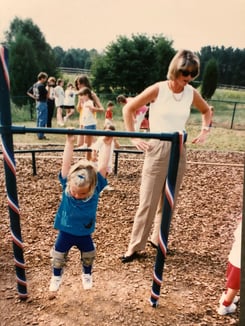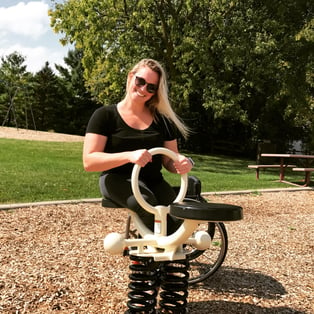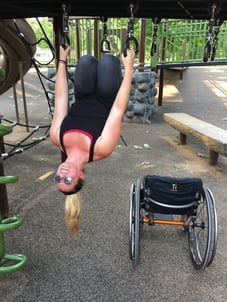Disabled Women Make History: Jill Moore White
To celebrate the achievements of women with disabilities, the Disabled Women Make History blog series is based on interviews with passionate, determined, and talented women with paralysis.
Join us monthly as we celebrate these women and acknowledge the complexities, struggles, and accomplishments of women with disabilities.
“Play is a universal language, and it’s something everyone deserves.”

Jill Moore White on inclusive playgrounds, experiences as a disabled woman in the professional world of play, and forging her own path.
“I honestly think I have a cartoon of a job because some days I truly cannot believe people pay me to do this,” says Jill Moore White, a 28-year-old dog mom and Inclusive Play Specialist from Minnesota. “I get to educate communities on what inclusion looks like and the best practices to create it, and most importantly, I get to play. I get to go to playgrounds and test products and give feedback. I get to be a part of a conversation that people with disabilities weren’t always invited to.”
Jill, who moved to Minnesota to work for playground manufacturer Landscape Structures Inc, never planned to play on playgrounds professionally. She attended the University of Illinois at Urbana-Champaign, where she competed on their wheelchair racing team and studied industrial design. Jill left design school with a goal of redesigning urinary catheters because many catheter users are ashamed of their catheters, and the design of catheters makes a big impact.
“Catheters were designed for the hospital and never really left. They’re something used in everyday life, more so than feminine hygiene products for their users, and yet they’re given brightly colored packaging with very little subtlety,” Jill explained. “I found that some users were so ashamed of this medical product, that they’d rather place a used catheter back in their purse with all of their other belongings than throw it away.”
With this in mind, Jill set off to redesign the catheter. As her journey began, her hometown of Charlotte, NC, had just held and hosted the largest Paralympic trials in history in 2016. Jill was invited to speak at a conference about what it was like to host trials as a community and the importance of play and adaptive recreation. Staff from Landscape Structures attended Jill’s presentation and approached her afterward to invite her to Minnesota to tour their factory.
“I had never toured a playground factory before, so it sounded like a fun enough invitation. I flew to Minnesota, took the tour, and – at the age of 24 – went on my very first inclusive playspace where I could access and do just about everything. A few months later, I got an email saying I was hired. I said, ‘Cool! For what?’ And began a journey of my own.”
Jill had rarely played on playgrounds as a kid because, for the most part, they were inaccessible to her. Because she did not get to play on playgrounds, she didn’t know what she was missing and that made her job all the more difficult at first.
“I didn’t know this was where people were forging lifelong friendships, or developing critical life skills, learning how to socializing, stretching their imaginations, learning risk and mastery and success,” Jill candidly admitted. “It’s not that I didn’t have friends, it’s that I was missing out on one of the first places in childhood that’s supposed to say ‘Yes, you’re meant to be here and a part of this. That you have a vitality that you should be contributing.’ It was never my peers telling me I wasn’t invited; it was the designed environment.”
That’s what makes Jill’s role at Landscape Structures so unique. It’s not her extensive design knowledge (though that does help!), it’s her experience as a person with a disability who was not able to participate in inclusive play growing up. “I get to lead the conversation, not with stats, figures, and telling people it’s the right thing to do – but with lived experience on why creating play for all actually matters.”
For Jill, the journey to becoming a confident Inclusive Play Specialist – and a confident disabled woman – wasn’t easy. Her job is to advise about inclusive playgrounds, but she had never been to an inclusive playground as a child. In fact, many of the environments that she grew up in were not inclusive. Because of this, Jill struggled with developing her social skills and believing in herself. “I didn’t value my personality. I had a killer sense of humor and didn’t know how to speak to people well enough to show it. I didn’t think I was attractive, or that “normal” people wanted to be around me because I looked so different. An inclusive play environment could have fixed that. Whatever color, creed, or ability we may have - we all inherently know how to play. This is where we combat stigmas early on and create fierce young advocates in the process. Play is a universal language, and it’s something everyone deserves.”

Jill also believes that the lack of disabled women mentors impacted her. “I didn’t have any disabled women mentors – I only had a book by Jean Driscoll, a strong woman wheelchair racer.” Jill clung to her connection with Jean Driscoll and wishes that she had more disabled women role models in her life while she was growing up.
“I thought Jean Driscoll was the coolest, and I could see parts of myself in her story. I knew her story and I was obsessive. Her enemies became my enemies. In fact, it was so deep-seated that when I met Candace Cable, I was ready to hate her – but she ended up being absolutely wonderful and is at the top of my list of people I look up to.” Jill shared with a laugh, and then quickly added, “Now imagine if I had met a disabled artist, thespian, or speaker – I think that would have really changed my perspective and pursuits. There’s a massive power in simply knowing it’s possible.”
Reflecting on her own childhood, Jill has advice for girls with disabilities today: “Never downplay what you’re good at or what you love. One of the hardest things I had to learn was what I loved, and not what I tolerated because it was available. I always wanted to be a theatre kid, but our theatre wasn’t accessible. Instead, I did sports. I liked them, but it wasn’t until I left them that I found there are things I am WAY more passionate about. Anything you have a true passion for, you’re going to dedicate yourself to in the most authentic way possible, and THAT is what makes a leader. Passion, not tolerance.”
Join Our Movement
What started as an idea has become a national movement. With your support, we can influence policy and inspire lasting change.
Become an Advocate